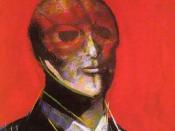AMERICAN PSYCHO
"In such a world, art becomes the remaining link to the unknown."
In his satirical novel American Psycho, Bret Easton Ellis provides the framework for his readers moralise on a level unobtainable through traditional narrative. Through his protagonist, Patrick Bateman, the author parodies 80's America to a point beyond comfort, concerned more with cultural exploration and exaggeration than moral positioning. Bateman takes us to a heightened moral and emotional void decaying with indifference. Violence is entertainment rather than reality and sex is a process of consumption and material exchange. Our insight into every aspect of Bateman's shallow world provides the ultimate voyeuristic viewpoint for a society unable to see itself yet in the nature of satire, Ellis never condemns it. He forces not only his readers, but those involved in the censorship debate over the novel to question their own values.
When asked what shocks him the most, Ellis replies, "the mediocrity of the culture - of popular culture and people's blind acceptance of it."
This is exactly what Ellis explores in American Psycho, though not at a level that is comfortable for the reader. The role of the satirist is to parody its subject, therefore exaggeration is the key to the style. Accordingly, Patrick Bateman is painted as the personification of society's values, contradictions and attitudes. He is a disturbingly shallow character living in world where people can only consume. When he hires a prostitute he explains 'I don't know her real name, I haven't asked, but I told her to respond only when I call her Christie.' Bateman feels that his money gives him the power to possess and use anything or anyone as he wants, even if it means skinning them alive. His voice often reads like a fashion or music magazine and a conversation...



Fantastic title
The title really grabbed my attention, I guess it just goes to show how important a good title can be in attracting the interest of the reader.
1 out of 1 people found this comment useful.